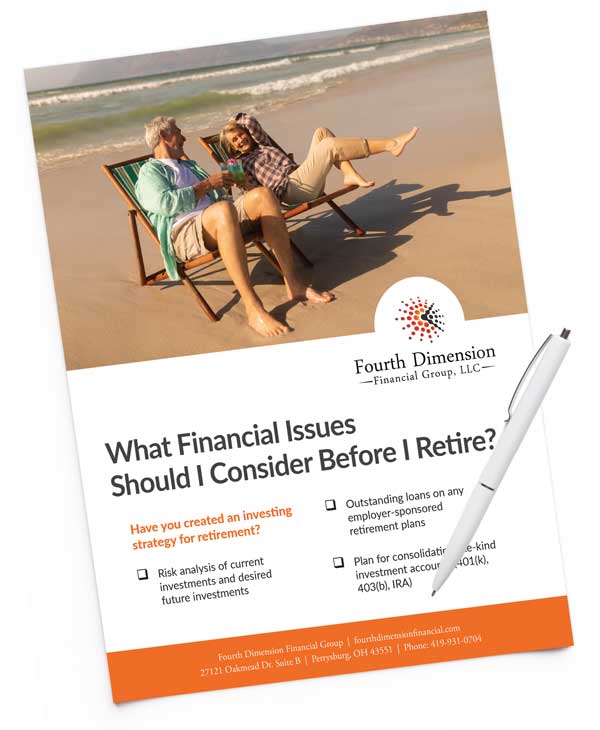Resources
Featured Articles

Choose to Never Retire?

Understanding Tariffs and Their Impact on Your Retirement Investments

Retirement Checklist

Fourth Dimension Financial Group

Who’s Really Working for You in the Financial World?

What do all the Letters Mean After a Financial Advisor’s Name?

Portfolio Tax Efficiency

Risk Management

Investment Management Services

Pension Decision Planning Services
Browse the Archives

Show Your Work: Why Transparency Matters in Retirement Planning

Unlocking the Mystery of Income Taxes

Social Security Strategy: Do You Have One?

Pension Decision: Just One Critical Piece of Information Is Needed to Decide

Retirement Blueprint: Building Your Fiscal House on Solid Ground

Investing For Retirement So You Can Remain In Retirement

A World of Extremes

A Biden Presidency

The Election and Markets

Drinking From The Pond

Sport-Tuned Suspension

The Harp Player
If you’re looking for something specific, browse our planning strategies:
Fourth Dimension Financial Group, LLC (“Fourth Dimension”) is an Ohio Registered Investment Adviser. Fourth Dimension and its representatives are in compliance with the current registration requirements imposed upon registered investment advisers by the state of Ohio and those states in which Fourth Dimension maintains clients. Fourth Dimension may only transact business in those states in which it is notice filed, or qualifies for an exemption or exclusion from notice filing requirements. Fourth Dimension’s web site is limited to the dissemination of general information regarding its advisory services to prospective clients. Accordingly, the publication of Fourth Dimension’s web site on the Internet should not be construed by any prospective client as Fourth Dimension’s solicitation to effect, or attempt to effect transactions in securities, or the rendering of personalized investment advice for compensation, over the Internet. Fourth Dimension does not provide tax or legal advice. You should contact your tax advisor and/or attorney before making any decisions with tax or legal implications. Furthermore, the information resulting from the use of tools or other information on this web site should not be construed, in any manner whatsoever, as the receipt of, or a substitute for, personalized individual advice from Fourth Dimension.
For additional information about Fourth Dimension, including registration status, fees, and services, contact us for a copy of our disclosure brochure. Fourth Dimension does not make any representations as to the accuracy, timeliness, suitability, completeness, or relevance of any information prepared by any unaffiliated third party, whether linked to Fourth Dimension’s web site or incorporated herein, and takes no responsibility therefore. All such information is provided solely for convenience purposes only and all users thereof should be guided accordingly.


